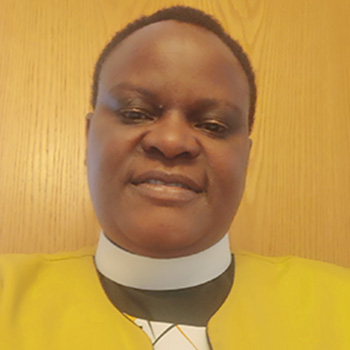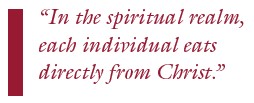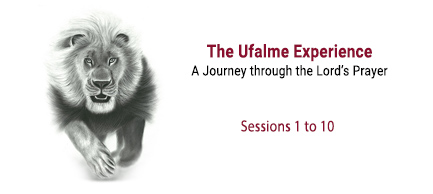Back to series


Read and reflect on the following article by Rev. Capt. Carolyne Adhola
(Download this article as a PDF).
Will God Feed His People?
This gospel of John 6:1-15 records Jesus’ feeding of many people with very little. Jesus seemed to have known the crowd’s needs. He doesn’t ask where they could get food for all these people. He asks where they could “buy” food. Philip’s answer could have been, “there are a lot of people, but nothing is difficult for you, Lord.”
However, Philip’s response shows that he was thinking only in terms of money and the marketplace, for he told Jesus that even if each of the people took only a small piece of bread, it would take more than two hundred denarii to feed them. Let’s think about it in the Kenyan context. There are 5,000 men. To feed everyone, even at the lowest of 100 KES per meal, it would take 500,000 KES. This was a huge sum and it must have seemed impossible to the disciples.
The Bread of Life
Did Jesus need a boy’s lunch in order to perform this kind of miracle? Absolutely not. He had the power of God the Father. He could have literally rained down manna from heaven. But I believe that this young boy’s sacrifice was at the heart of this great miracle. It was to show the nature of hospitality in the young boy’s heart. God multiplies our resources when we give.
Jesus took the loaves, gave thanks and distributed to those who were seated. He did the same with the fish (6:11). John focuses on Jesus as the initial distributor because he links this feeding to spiritual feeding in the discourse that follows (6:26-71). In the spiritual realm, each individual eats directly from Christ, the Bread of Life. In spite of the large number of people and the limited resources, Jesus fed them all until each was satisfied (6:12-13).
 Jesus taught us to pray “Give us this day our daily bread.” I believe that Jesus knows our needs even before we mention them. But He wants each of us to believe in Him as the Bread of Life. Then, when circumstances are beyond our control, we can expect Him to take care of our physical needs, as He sees best. We can trust Jesus to provide for us, for He is the Lord of all creation.
Jesus taught us to pray “Give us this day our daily bread.” I believe that Jesus knows our needs even before we mention them. But He wants each of us to believe in Him as the Bread of Life. Then, when circumstances are beyond our control, we can expect Him to take care of our physical needs, as He sees best. We can trust Jesus to provide for us, for He is the Lord of all creation.
A Testimony of God’s Provision
I have experienced God’s provision in many ways in my own life, but one way that was quite practical was on the eve of Christmas in December 2003. My husband had died earlier that year, and I had only 200 KES to my name. As a widow I was torn between giving thanks to God with this money or buying food for my little children to eat on Christmas day. I made this prayer at night, “God may you provide for us tomorrow in Your own way so that my children do not feel the absence of their father who has been providing for us.”
In the morning we prepared and went to church. My heart was so troubled, because I thought we would have nothing to eat for Christmas. . . but I gave thanks to God and placed my 200 KES in the offering. My older daughter was only 4 years old, and she asked me on our way back home, “mum what are we going to eat for Christmas?” I found tears rolling down my cheeks, but I answered her, “God has been providing for us, even today He will provide for us.” Alas! As we were passing by my step-mother in-law’s home, she had just arrived from Mombasa. She called my older daughter who was named after her mother in-law. My daughter went with my niece. Then they both came back with two heavy cartons loaded with shopping of Christmas goodies and a gift of 20,000 KES. This was indeed God’s provision. God has always provided for me, even in very difficult times, and I have learnt to give thanks to God in everything.

Carolyne Adhola
SpeakerRev. Capt. Carolyne Adhola has worked as a parish minister, youth pastor, and church planter in Western Kenya where she established the Daughters of Zion Widows and Orphans group. She’s also served as a chaplain and lecturer at St. Paul’s University in Limuru, Kenya. She holds a Master of Theology and Bachelor of Divinity from St. Paul’s University, a Higher Diploma in Theology from Carlile College, and is currently pursuing a Master of Arts in Christian Formation from Virginia Theological Seminary.

 COPYRIGHT: This publication is published by C.S. Lewis Institute; 8001 Braddock Road, Suite 301; Springfield, VA 22151. Portions of the publication may be reproduced for noncommercial, local church or ministry use without prior permission. Electronic copies of the PDF files may be duplicated and transmitted via e-mail for personal and church use. Articles may not be modified without prior written permission of the Institute. For questions, contact the Institute: 703.914.5602 or email us.
COPYRIGHT: This publication is published by C.S. Lewis Institute; 8001 Braddock Road, Suite 301; Springfield, VA 22151. Portions of the publication may be reproduced for noncommercial, local church or ministry use without prior permission. Electronic copies of the PDF files may be duplicated and transmitted via e-mail for personal and church use. Articles may not be modified without prior written permission of the Institute. For questions, contact the Institute: 703.914.5602 or email us.
Speakers

Carolyne Adhola
Speaker
Team Members

Carolyne Adhola
SpeakerRev. Capt. Carolyne Adhola has worked as a parish minister, youth pastor, and church planter in Western Kenya where she established the Daughters of Zion Widows and Orphans group. She’s also served as a chaplain and lecturer at St. Paul’s University in Limuru, Kenya. She holds a Master of Theology and Bachelor of Divinity from St. Paul’s University, a Higher Diploma in Theology from Carlile College, and is currently pursuing a Master of Arts in Christian Formation from Virginia Theological Seminary.



